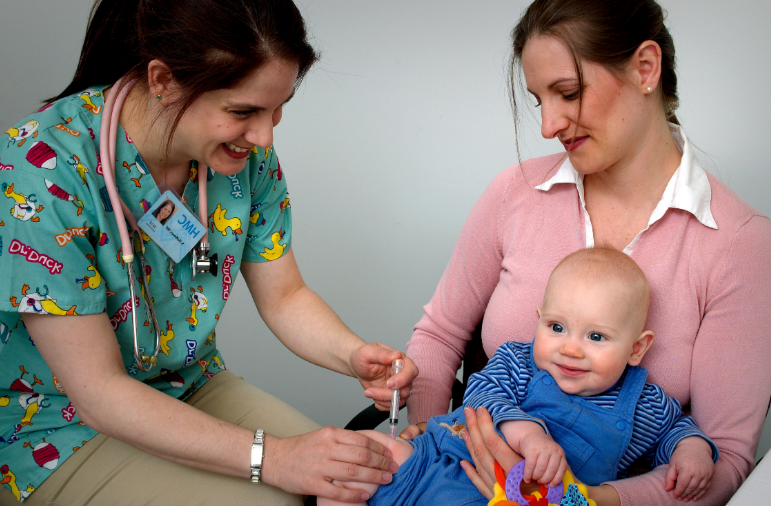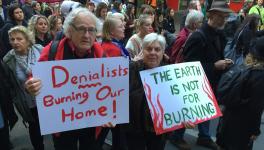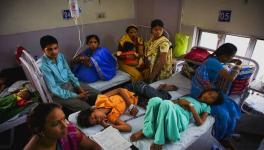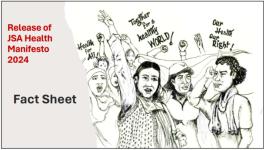How has Measles Made it Back into the US?

With decreasing vaccination rates among infants and children under 18, the collective herd immunity to such preventable diseases as measles has also gone for a toss
The United States is in the middle of the third-largest measles outbreak of the century. According to data put up by the Centers for Disease Control and Prevention (CDC), as of March 21, the US has 314 confirmed cases in 12 States, mostly among infants and children. 5 states – California, New York, Texas, Washington and Illinois – have the bulk of the cases. It does not help that these five States account for a third of the country’s population. The rate at which cases are being reported has given rise to fears that the number of cases in March alone might surpass the number for the whole of 2018, which was 372. And if the outbreak continues at this rate, there are real possibilities of the number of cases crossing that in 2000 when 667 cases were reported.
But how did a disease that was declared as “eliminated” in 2000 in the United States make a big come back in the twenty-tens?
A number of reasons have been associated with the outbreaks. One reason often cited is the introduction of foreign virus strains into the country through people who were infected outside the continent. But this only explains the first few outbreaks that happened, for instance a patient zero for the outbreak in 2006 was a vaccinated 8-year-old who was infected during a family trip abroad. Some outbreaks also begin with infants who are less than a year old, ie, those not old enough to be immunized with measles-mumps-rubella (MMR) vaccine.
When the CDC declared the disease as “eliminated”, what it meant was that the population had acquired immunity against the indigenous strain of measles virus, bringing cases of infections from such strains to zero, especially among newborn infants who benefit from the herd immunity. Within a few years, travellers carrying foreign strains have started become more and more common, causing a reemergence of the disease first in the form of a handful of infections and then later, as outbreaks among the vulnerable elderly and newborn babies. But such outbreaks through the introduction of foreign strains, were also very easily containable, since the target demographic that would need treatment was easily identifiable. But as outbreaks became more frequent and bigger in numbers, a more underlying problem became evident: the anti-vaccination movement or the anti-vaxxers.
Peoples Dispatch spoke to Julia Robinson, regional representative for North America of the People’s Health Movement, about the possible causes and the socio-political dynamics of the current outbreak. Talking about the anti-vaccination movement, she explains how declining vaccination rates have made outbreaks more and more commonplace. “My sense is that the outbreaks are intensified by … a declining rate of vaccination in communities is making outbreaks of diseases such as measles more frequent,” she says. “Where I live in Washington state, there have been more than 75 reported cases of measles, most of which have been among children who were unvaccinated. You just don’t see outbreaks like this among vaccinated populations, even when there may be new strains that enter the country.”
The pacific northwest (PNW), which includes Washington, has been among the most vulnerable for most of the outbreaks in the past decade. Explaining this, Robinson points to the fairly successful anti-vaccination movement in the region, “it’s no coincidence that the PNW is also home to some of the best organized and most vocal anti-vaccination movements, and as a result you have these completely preventable outbreaks.” She also talks about legal provisions available in Washington that allows for non-medical vaccine exemptions, as part of the problem. In the United States, according to the National Vaccine Information Centre, only 3 states, viz, California, Mississippi and West Virginia, offered vaccine exemption for strictly medical reasons. In the rest of the United States, exemptions based on non-medical reasons, including religious and ‘philosophical’ reasons, are allowed. This makes it very easy for anti-vaxxers to exhort parents into opting out of vaccinations, bringing down immunized population drastically.
Unlike most countries around the world, there are no legal provision to punish anti-vaxxers, despite their proven threat to the overall public health, or consider it child abuse to withhold immunization to one’s children. A large part of the reason why the anti-vaxxers and the parents exempting their children from vaccination, are not cracked down upon, is because of the understanding of individual liberty in the United States. Any attempt at legislating out the non-medical exemption to vaccines are met by invocations of totalitarianism. For instance, an Arizona state legislator, Kelly Townsend, reacting to the state governor’s decision to refuse to sign bills that allow vaccine-exemption on religious grounds, said that mandatory vaccination is “communist” and as violating “the very sovereignty of our body”. Townsend is not the only one. Several legislators with varying degrees of success pushed anti-vaxx legislations in different States, allowing parents to withhold vaccines to their children, like the kind that was passed in Texas in February 2019. This is despite outbreaks of easily preventable diseases being far more common in the US, than in any of the developed nations and many of its developing neighbors.
Much like many other conspiratorial anti-modernity and anti-science movements, the social class that has given so much traction to the anti-vaxx discourse is the affluent. Robinson points to a 2016 study by a group of public health researchers from The State University of New York at Albany, that examined the vaccination rates among students attending expensive private schools and subsidized public schools. Accordingly, apart from certain religious convictions, there is a significantly higher correlation between those students attend private schools and vaccine exemption. “Looking at this” says Robinson, “from a political economy of health lens, it’s interesting to note that studies are showing that vaccine refusal seems to be greater among the rich.” She does ask us to be cautious of jumping to conclusions though, pointing out that correlation between vaccine exemption, personal beliefs, political biases and social class is very complicated, and requires more rigorous study.
However, she does talk about one factor that is very commonly visible – “that the current generation of US parents who are opting out of vaccines for their kids have never had to see the devastating effect of some of these diseases. They’ve never seen kids unable to walk after a bout with polio, or die from the flu or measles, or face a myriad of long-term or permanent effects of these preventable diseases. Combine that with a lack of knowledge (or belief in) the very fundamental concept of herd immunity (where 90-95% of the population needs to be vaccinated to prevent an outbreak), and fear around the health of their kids, and you’ve got a perfect recipe for what we are seeing now with this outbreak of measles.”
Recently, on March 27, the Rockland county administration in the state of New York, which has the highest number of reported cases this year with 155 infected cases, has taken an unprecedented step to curb the outbreak. It has banned unvaccinated children from public for a 30-day period, making it punishable to let them out with a fine of USD 500 or a jail term of six months for the parents. A move like this has definitely sent shockwaves across the United States, with anti-vaxxers crying foul over the supposed infringement of civil liberties. Even many in the public health services, who have advocated in favour of vaccination were taken by surprise. Dr. Jeffrey Duchin, a public health official in Seattle, Washington, speaking to USA Today said that this ban is “… not something that I’ve seen before in my professional experience”. He further added that a move like this only shows that “the local public-health people feel that they have an extraordinary outbreak on their hands.”
Despite the controversy surrounding the move by the county administration, if the move helps to mitigate the outbreak, even a little, experts feel it could help other local and state administrations to undertake similar emergency measures to manage the epidemic.
Get the latest reports & analysis with people's perspective on Protests, movements & deep analytical videos, discussions of the current affairs in your Telegram app. Subscribe to NewsClick's Telegram channel & get Real-Time updates on stories, as they get published on our website.
























